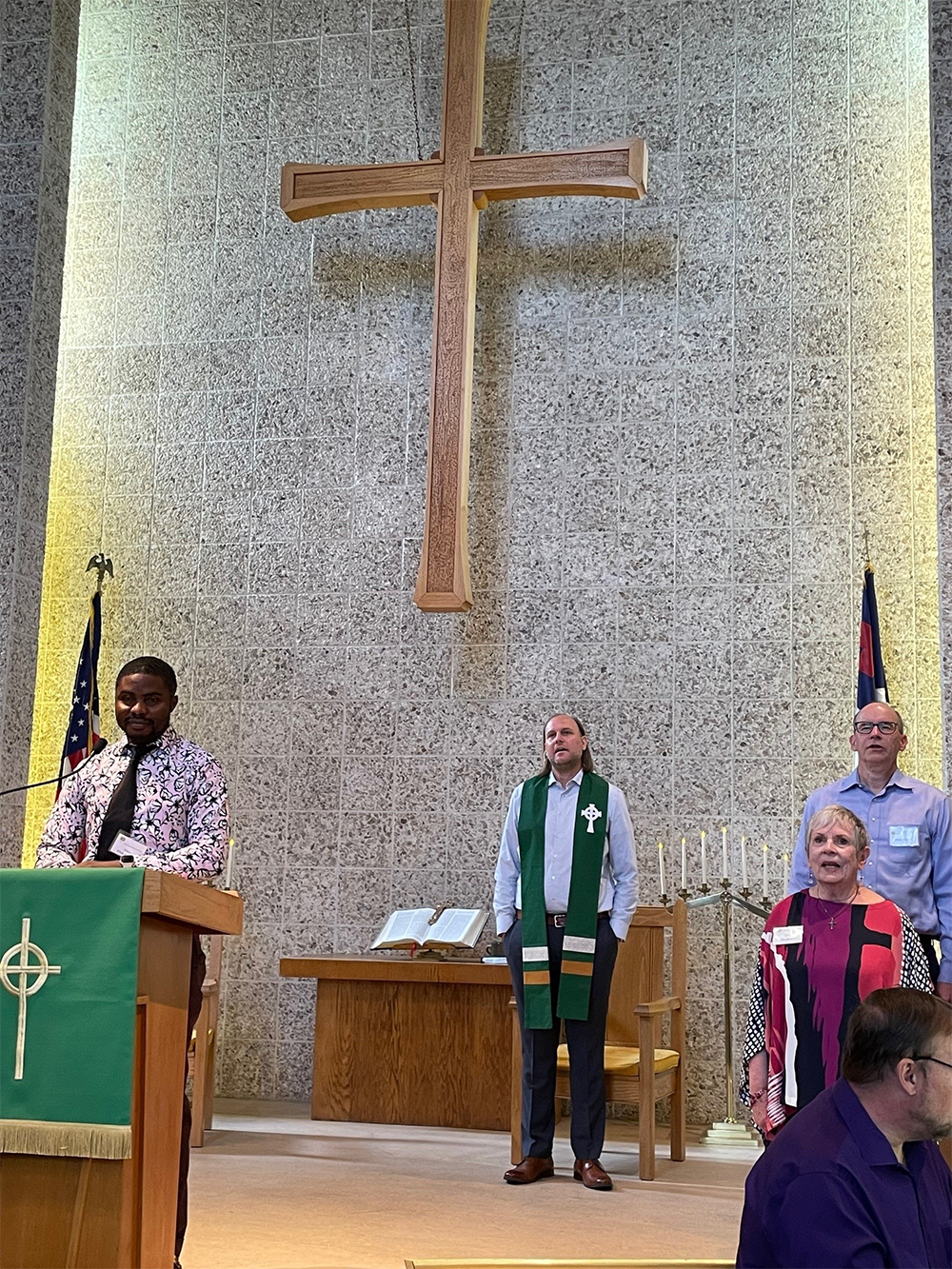
The Rev. Nathan Sautter (in green stole), pastor of the Cottonwood Presbyterian Church in Murray, leads worship on Sunday morning. Photo by Emily Enders Odom

The Rev. Nathan Sautter (in green stole), pastor of the Cottonwood Presbyterian Church in Murray, leads worship on Sunday morning. Photo by Emily Enders Odom
After two busloads of General Assembly visitors had completely filled the sanctuary of Cottonwood Presbyterian Church, responding with an enthusiastic — if perhaps louder than expected — “And also with you” to the pastor’s traditional greeting, all the Rev. Nathan Sautter could say was, “Wow.”
“I’d like to welcome everyone to Utah,” Sautter began, taking it all in. “The hope and prayer of our presbytery is that you get a taste, a feel and a vibe of who we are as we seek to witness to Jesus Christ in our community.”
And in every aspect of the worship hour that followed — and the generous lunch that was cheerfully served afterwards in the bustling fellowship hall — Sautter, the church staff, its members, worship and music leaders, including the CPC choir, praise band and bell choir, handily fulfilled that hope.
Today, Cottonwood, which was founded in the 1950s, is a dynamic congregation with people from seven different nations — Ghana, Cameroon, Nigeria, Pakistan, Myanmar, South Korea and China — worshiping together.
The Rev. Ed Johnson, stated clerk in New Hope Presbytery, and his wife, Kathy, a member of Western Boulevard Presbyterian Church in Raleigh, North Carolina, were among those worshiping from the Assembly.
“We were drawn to the church for its diversity and how international it seems, and also because we’re a Matthew 25 presbytery,” Johnson said. “Kathy and I have also missioned quite a bit internationally ourselves.”
Worshipers were challenged by Sautter’s powerful message titled, “Seen,” on Mark 5:21-43, the story of Jesus raising Jairus’ daughter and the healing of a woman with a hemorrhage.
Sautter opened by asking those gathered this question: “Have you ever been desperate? Really, really desperate, where you did something stupid or dangerous?”
Sharing examples from his own experiences as a foster parent desperate for sleep or quiet to his community context and the influx of Venezuelan asylum seekers “who walked here to seek safety and freedom,” Sautter said desperation can make people do something they would not otherwise do.
“We’ve seen it play out in Ukraine, Palestine, all over the world,” he said.
Turning to the Gospel text, Sautter described “two people at the end of their rope” frantically approaching Jesus, a father who is desperately trying to save his beloved 12-year-old daughter and a woman who has been bleeding for 12 years.
Describing the desperate father’s chagrin at Jesus having allowed himself to be interrupted by the hemorrhaging woman, Sautter wondered whether his GA listeners might be feeling likewise.
“Here’s a man who has just successfully convinced this rabbi to come to his home and now he stops,” Sautter said. “’Jesus, the clock is ticking — we gotta go!’ When you arrived, were you thinking, ‘Let’s get this thing started. I have commissioner business to get to!’”
Interruptions, Sautter, contended, are part of the call following Jesus.
“Sometimes in the interruption there is a moment of great grace and hope and healing,” he said. “Every opportunity with a person is an opportunity for transformation, healing and new life.”
But it all comes down to Jesus.
“Desperation makes us do all kinds of things,” said Sautter, “but what are we willing to do? Are we willing to bring them to the One who does heal?”
Once again weaving in the General Assembly context, Sautter observed that Presbyterians are “desperate about why young people don’t come to church and why what we say nobody cares about anymore.”
“This text reminds us that if we’re not desperate enough to touch the cloak of Jesus — to get Jesus into the room — then all that we do doesn’t matter, because he’s the one who has hope and healing,” said Sautter. “May we continue to bring people to Jesus until that day when mothers and fathers and parents and children don’t have to leave their homes because of war and violence. Our hope is in Jesus. He sees us. He calls us to make things new. And he wants us to bring others to know him, too.”
